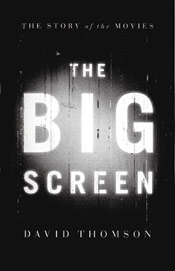Fall 2012
(Farrar, Straus, Giroux, 608 pages, $35)
By David Thomson
 Film critic and historian David Thomson’s reputation for rhapsodic prose and unabashedly opinionated criticisms precedes him, and they are indeed in fine form in his voluminous account of the history of film, The Big Screen: The Story of the Movies. It is, as the name implies, a history of the motion picture industry—from its inception to Inception—a crackling account of this often-raucous enterprise and an inspired study of its place in 21st century culture. And while Thomson pays due attention to the studio suits, scribes, and stars, he says it is the creative vision of directors who ultimately transformed the business into an art form.
Film critic and historian David Thomson’s reputation for rhapsodic prose and unabashedly opinionated criticisms precedes him, and they are indeed in fine form in his voluminous account of the history of film, The Big Screen: The Story of the Movies. It is, as the name implies, a history of the motion picture industry—from its inception to Inception—a crackling account of this often-raucous enterprise and an inspired study of its place in 21st century culture. And while Thomson pays due attention to the studio suits, scribes, and stars, he says it is the creative vision of directors who ultimately transformed the business into an art form.
Thomson is not necessarily an auteurist, but the directors of classic American and French cinema shaped his love of film, and this book acknowledges his belief in the authoritative stamp of ‘director.’ Even in Hollywood’s golden age, when many studio directors were cogs in the factory wheel, Thomson speaks of the battle for creative rights between director and studio. DGA founding father King Vidor, whom Thomson praises for his composition and innovative imagery, fought the system and raised his own money to create projects he believed in, such as the Depression-era tale, Our Daily Bread. These early innovators may have been at the studio’s bidding, but as Thomson points out, still created unforgettable films of artistic merit and lasting social relevance.
Far from an assessment of directorial technique, The Big Screen examines the aesthetic of directors, explaining the subtleties of their craft from David Lynch’s belief in the “unconscious medium of imagery” to the poetic brutality of Martin Scorsese’s great gangster pictures that are “executed with the precision of a surgeon at the scene of a massacre.” Thomson also gives television directors their due with an adulatory appraisal of their work, singling out Tim Van Patten (Boardwalk Empire, The Pacific) as a case study of the often overlooked artistic skill and stamina the job demands. Van Patten directing 20 episodes of The Sopranos, Thomson argues, is the equivalent of directing eight feature films. Food for thought.
The Big Screen is meant to make us consider what the movies have given us and how we feel about them. Personal, reflective, and full of the charming (if not occasionally obstinate) prose for which Thomson is so well known, the book is a love story about the movies—a story that is not finished yet.
Review written by Carley Johnson.